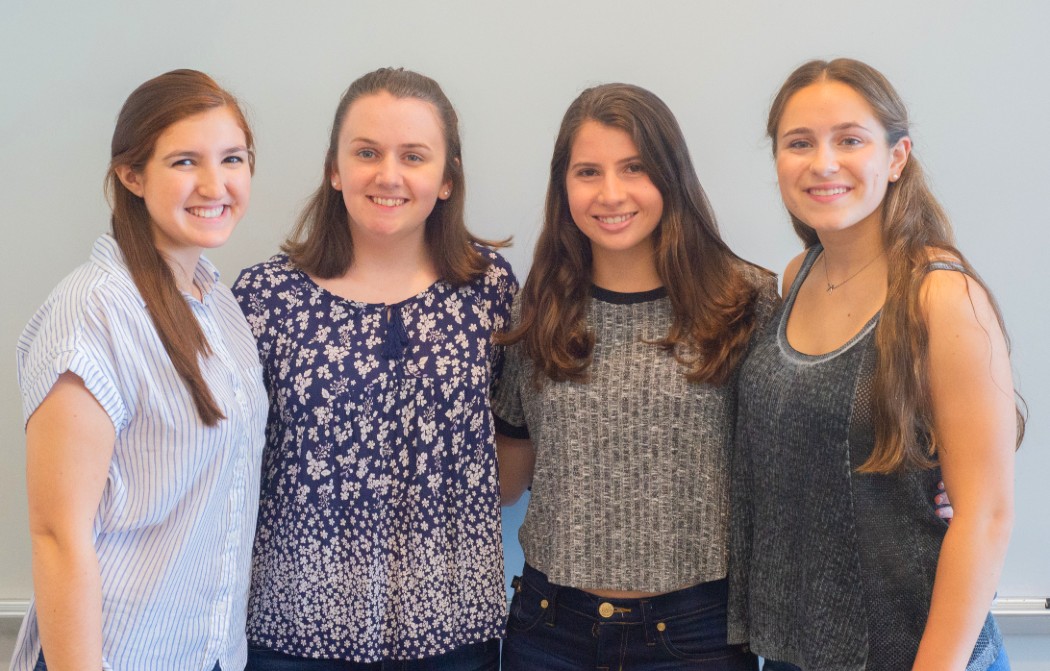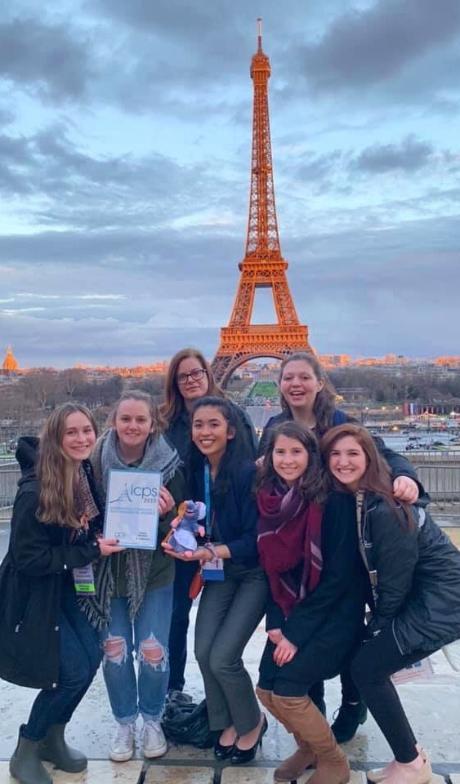‘Door Opening’ Experiences
Students in Professor Gretchen Gotthard’s Lab perform research, present at conferences and co-author articles in academic journals.By: Ava Duskic ’23 Monday, March 29, 2021 09:00 AM
 From left, Desiree Bsales ’20, Alison Bashford ’20, Jessica-Ann Golbitz ’19 and Rebecca Shear ’21 in Professor Gretchen Gotthard’s Lab in 2019.
From left, Desiree Bsales ’20, Alison Bashford ’20, Jessica-Ann Golbitz ’19 and Rebecca Shear ’21 in Professor Gretchen Gotthard’s Lab in 2019.When Rebecca Shear ’21 started college, she had a plan.
After attending Muhlenberg’s Brain Camp the summer before her senior year of high school and building a connection with the faculty members there, Shear knew her passion was to pursue a degree in neuroscience and work in a neuroscience research lab with those professors. Happily, reality exceeded her expectations.
Shear has worked in the research lab of Gretchen Gotthard, associate professor of psychology & neuroscience, since her first year on campus. Along with other student researchers, she has been conducting experiments that look at memory disruption and whether the emotional aspects of a traumatic memory can be weakened.
“Before we believed that if someone has PTSD and they experienced their trauma 20 years ago, the idea was sort of stuck,” Gotthard says. “Now we know we can remind them of the memory and do different things to change or weaken the memory.” One of the research projects focuses on using virtual reality to create a memory and then disrupts that memory consolidation process, with the goal of helping PTSD patients in the future.
In a second project, students in Gotthard's rat lab worked to determine the parameters for memory reconsolidation (i.e., when a long-term memory is recalled and reactivated). The research suggests people with very old traumatic memories may be helped by reconsolidation techniques as easily as those with newer traumatic memories.
 In March 2019, Shear, along with five other women student researchers in Gotthard’s neuroscience lab, Alison Bashford ’20, Desiree Bsales ’20, Victoria Castillo ’19, Jessica-Ann Golbitz ’19 and Hannah Gura ’20, presented both research projects at the International Conference for Psychological Science in Paris. Later that year, the women, along with Levelle Arnold ’20, Sabrina Barhoum ’21, Jake Dengler ’20, Sara Flash ’20 and Kevan Shah ’22, attended the Society for Neuroscience conference in Chicago, presenting the same experiments to a new audience.
In March 2019, Shear, along with five other women student researchers in Gotthard’s neuroscience lab, Alison Bashford ’20, Desiree Bsales ’20, Victoria Castillo ’19, Jessica-Ann Golbitz ’19 and Hannah Gura ’20, presented both research projects at the International Conference for Psychological Science in Paris. Later that year, the women, along with Levelle Arnold ’20, Sabrina Barhoum ’21, Jake Dengler ’20, Sara Flash ’20 and Kevan Shah ’22, attended the Society for Neuroscience conference in Chicago, presenting the same experiments to a new audience.
“I knew I was going to be able to do quality research with Professor Gotthard,” said Shear, who is a member of the College's volleyball team and currently mulling over several Ph.D. neuroscience program offers for the fall. “But I never expected to go to Paris or Chicago and be able to present as an undergraduate at these very competitive conferences that people I look up to scientifically and academically are consistently attending.”
Gotthard (back row, left, with the student team in Paris) understands how important research opportunities are for undergraduates. “I was fortunate to do undergraduate and post-baccalaureate research that really opened doors for me,” she says. “Being a first-generation college student who knew very little about the process of getting into graduate school and being successful in graduate school, the relationships I formed with my research mentors were invaluable. My motivation for working with student researchers is to provide the same ‘door-opening’ experiences for them.”
However, the opportunities didn’t end there. The rat lab research continued and after years of hard work, Bashford, Bsales, Golbitz and Shear were listed as Gotthard’s co-authors when the findings were recently published in the journal Learning and Motivation. As an undergraduate, Shear says this feat gave her an appreciation for the art of writing scientific papers.
A second paper was published in the same journal, with Gura listed as Gotthard’s co-author, along with Allison Davidson, associate professor of statistics. The team worked to determine what kind of prediction errors were needed to break down a memory, curating an experiment where human participants tried to remember a video they watched after being subjected to different prediction error conditions.
“Former researchers in my lab have been successful in a wide variety of areas including doctoral programs in neuroscience, clinical psychology, and neuropsychology; medicine and veterinary medicine; physical and occupational therapy; law school and public health programs,” says Gotthard. “I like to think that some of the success my former research assistants have had is due in part to their research experiences at Muhlenberg.”
